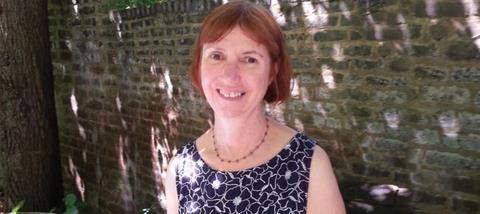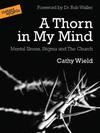
Wield was 34 when depression first set in. She had just started training in A&E and, with four children aged between six and 12, the timing could not have been worse.
‘I kind of woke up one day and thought “I’m depressed”,’ she says. ‘That was a surprise, because strong people don’t get depressed and there was also such a stigma about mental illness.’
The depression had a more lasting impact than she initially expected. ‘Christmas came and went and I was no better,’ Wield recalls. ‘Early in January I suddenly realised that I was thinking suicidal thoughts.’
The young doctor was hospitalised for six weeks and received electroconvulsive therapy (ECT), only seeing her children when she was allowed out on leave. Readmitted six weeks after she was discharged, Wield spent a further three months in hospital. This whole period is still a blur. ‘I soon started losing hope. I was just in and out of hospital,’ she says. ‘My brain worked so slowly as a result of depression; my movements were slow. Moving was a bit like wading through treacle.’
Wield tried to commit suicide twice and frequently self-harmed, and the doctor in charge of her treatment believed she would soon die. ‘I had been sectioned by that time,’ she says. ‘I believed I was the worst possible person in the world: the worst wife, the worst Christian.’
It’s easier in the world than in the Church to be depressed
A LIGHT BULB MOMENT
The one option left was a type of neurosurgery that is carried out just six times per year on patients with intractable depression or OCD. ‘The chances of getting to that stage are pretty rare,’ explains Wield. ‘The prognosis has to be that you’re going to die. I was permanently hospitalised by that stage. They wouldn’t even let me go home.’
The neurosurgery proved a significant turning point in Wield’s life. In fact, she is convinced that the almost immediate outcome was miraculous. ‘It was like a light switched on in my head all of a sudden,’ she says. ‘Imagine putting cables together and a light switches on. It felt physical and real, and my head filled with light.’
Soon after this sudden transformation, she heard a familiar voice in her head, which asked, ‘What about the self-harm?’ Despite hearing it over and over for the following three days, she refused to give in. ‘It went and I never self-harmed again,’ she says.
HIDDEN PAIN
While Wield managed to adjust back to family life fairly quickly and was back at work within nine months, her family struggled. ‘My husband Phil had lived with the fact that I might die at any moment for a long time,’ she says. ‘He was exhausted. We had the worst time in our marriage. I was so insensitive; I hadn’t realised what he’d been through. So it took our family quite a long time to adjust.’
Other Christians had also found it hard to get their heads around her illness, and she had stopped going to church during the early days of her depression as a result. ‘I was trying to pretend I was ok, because when I didn’t, people said stupid things like, “How’s your prayer life?” and “Are you reading the Bible enough?”’
Wield often felt she needed to hide her illness. ‘It’s easier in the world than in the Church to be depressed. Some Christians have this idea that you should always be happy – “the joy of the Lord is your strength” – when, in reality, Jesus was not happy all the time. He was a man of sorrows. Taking one verse and applying it to our Christian lives is to ignore whole chunks of the Bible. If you’re depressed or down or grieving, then that needs to be recognised.’
Initially, Wield had also tried to hide her illness from her family, particularly the children. ‘Even with Phil, if I felt down I would try and hide it from him because I didn’t want him to suffer. I didn’t used to talk to him about it. I do now, but that may be because I’m well. I’m not sure what would happen if I got ill again. I just pray I won’t.’
I believed I was the worst possible person in the world: the worst wife, the worst Christian
THAT SINKING FEELING
Believing she had been permanently cured by the neurosurgery, Wield suffered an unexpected relapse at the end of 2006. Phil had been made redundant and they both began to feel that God was calling them to Scotland. They found jobs in Aberdeen, but Cathy was back in hospital within nine months of the move. She remained there for six months and resigned from her job, believing she would never work again.
‘God was amazing during this time,’ she says. ‘He worked through so many things. I had a nurse counsellor called Bob who gave me psychotherapy every week. He’s not a Christian, but what he would go through with me, I would then take home and ask Phil to pray over. I was released from a lot of hang-ups that I had from my early life.
‘After I’d experienced what I thought was that miracle healing, I remember thinking: “God is the centre of my life and nothing is going to put him out of the centre.” That sense continued even though I was ill again, but this time I felt God was doing much deeper stuff in me.’
ROAD TO RECOVERY
Having written about her recovery in her first book, Life After Darkness (Radcliffe Publishing), Wield’s relapse was a real setback. ‘I thought I must be a terrible Christian,’ she shares. ‘Whenever I was ill I thought it was my fault. I used to just pray that God would take me. I was suicidal again, but slowly it got better.’
In 2009, Cathy and her family moved back to London as Phil was training to be a counsellor and psychotherapist, and around 18 months ago she was able to return to work. ‘We’ve been through a lot,’ she says. ‘In all of this I believe my relationship with God is the single most important thing.’
Cathy Wield’s second book, A Thorn in My Mind (Instant Apostle) is out now




























